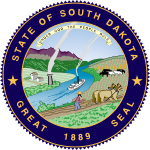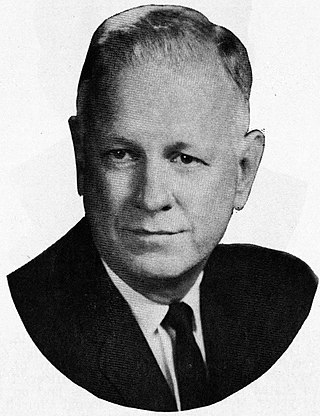
Nils Andreas Boe was an American attorney who served as the 23rd Governor of South Dakota from 1965 to 1969. He served as a judge of the United States Customs Court, later the United States Court of International Trade.

The 1974 United States Senate elections were held on November 5, with the 34 seats of Class 3 contested in regular elections. They occurred in the wake of the Watergate scandal, Richard M. Nixon's resignation from the presidency, and Gerald Ford's subsequent pardon of Nixon. Economic issues, specifically inflation and stagnation, were also a factor that contributed to Republican losses. As an immediate result of the November 1974 elections, Democrats made a net gain of three seats from the Republicans, as they defeated Republican incumbents in Colorado and Kentucky and picked up open seats in Florida and Vermont, while Republicans won the open seat in Nevada. Following the elections, at the beginning of the 94th U.S. Congress, the Democratic caucus controlled 60 seats, and the Republican caucus controlled 38 seats.
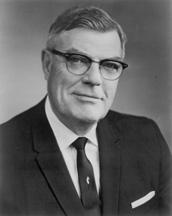
Joseph Henry Bottum was an American politician. He served as the 27th Lieutenant Governor of South Dakota and as a member of the United States Senate from South Dakota.

William Henry McMaster was an American politician who served as the tenth Governor of South Dakota from 1921 until 1925. A member of the Republican Party, he went on to serve as a member of the United States Senate from South Dakota from 1925 to 1931.
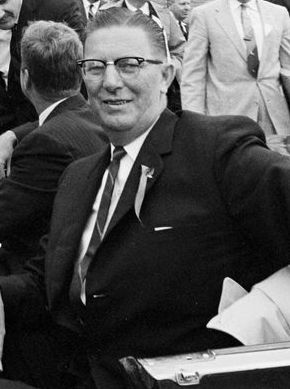
Archibald Maxwell Gubbrud was an American politician who served as the 22nd Governor of South Dakota.

The 1948 United States Senate election in South Dakota took place on November 2, 1948. Incumbent Republican Senator Harlan J. Bushfield, suffering from poor health, declined to run for re-election. On September 27, 1948, he died in office; his wife, Vera C. Bushfield, was appointed to succeed him. Congressman Karl E. Mundt easily won the Republican primary and advanced to the general election, where he was opposed by Democratic nominee John A. Engel, an attorney. Hundt defeated Engel in a landslide.
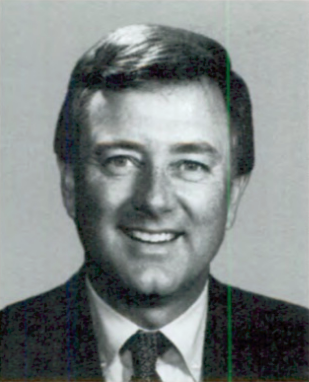
The 2014 United States Senate election in South Dakota took place on November 4, 2014, to elect a member of the United States Senate to represent the state of South Dakota, concurrently with the election of the Governor of South Dakota, as well as other elections to the United States Senate in other states and elections to the United States House of Representatives and various state and local elections.

The 1942 United States Senate election in South Dakota took place on November 3, 1942. Incumbent Democratic Senator William J. Bulow ran for re-election to a third term. During the primary, Bulow was attacked for being insufficiently supportive of President Franklin Roosevelt's foreign policy and war preparedness. Former Governor Tom Berry, Bulow's chief opponent, drew a contrast between Bulow's isolationism and his support for Roosevelt's policies. In the end, Berry defeated Bulow in a landslide, and advanced to the general election, where he faced Harlan J. Bushfield, the incumbent Republican Governor of South Dakota. As Republicans gained ground nationwide, Bushfield defeated Berry in a landslide to pick up the seat for the Republican Party. Bushfield did not serve his full term, however; shortly before the 1948 U.S. Senate election, he died.

The 2018 South Dakota gubernatorial election took place on November 6, 2018, to elect the next governor of South Dakota. Incumbent Republican governor Dennis Daugaard was term-limited and could not seek a third consecutive term.

The 1956 United States Senate election in South Dakota took place on November 6, 1956. Incumbent Republican Senator Francis H. Case ran for re-election to a second term. In the general election, Case was opposed by former State Representative Kenneth Holum, who was the 1954 Democratic nominee for the U.S. Senate. Owing in part to anger among the state's farmers, the race between Case and Holum was quite close, with Holum leading Case on election night and only falling behind the next day. Case ended up narrowly winning re-election, defeating Holum by just 4,620 votes.

The 1950 United States Senate election in South Dakota took place on November 7, 1950. Incumbent Republican senator Chan Gurney ran for re-election to a third term. He was challenged in the Republican primary by Congressman Francis H. Case, who had represented the 2nd District since 1939. In the general election, Case faced John A. Engel, an attorney and the 1948 Democratic nominee for the U.S. Senate. As the Republican Party was making significant gains nationwide, Case defeated Engel in a landslide.
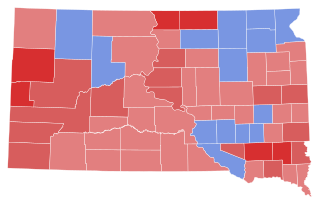
The 1954 United States Senate election in South Dakota took place on November 2, 1954. Incumbent Republican Senator Karl E. Mundt ran for re-election to his second term. He was opposed by former State Representative Kenneth Holum, the Democratic nominee. Mundt defeated Holum in a landslide to win re-election.

The 1960 United States Senate election in South Dakota took place on November 8, 1960. Incumbent Republican Senator Karl E. Mundt ran for re-election to his third term. He was challenged by Congressman George McGovern. Both Mundt and McGovern won their respective primaries unopposed and the campaign between the two began. Despite the landslide victory for Vice-President Richard M. Nixon over John F. Kennedy, the race between Mundt and McGovern was quite close. Mundt narrowly won re-election, and McGovern ran for the U.S. Senate again in 1962. He served alongside Mundt for a decade.

The 1962 United States Senate election in South Dakota took place on November 6, 1962. Incumbent Republican Senator Francis H. Case ran for re-election to a third term. He won the Republican primary against Attorney General A. C. Miller, but shortly after the primary, died. The Republican State Central Committee named Lieutenant Governor Joseph H. Bottum as Case's replacement on the ballot, and Governor Archie Gubbrud appointed Bottum to fill the vacancy caused by Case's death. In the general election, Bottum was opposed by Democratic nominee George McGovern, the Director of Food for Peace and the former U.S. Congressman from South Dakota's 1st congressional district. The contest between Bottum and McGovern was quite close, with McGovern narrowly defeating him for election by just 597 votes, making him the first Democrat to win a Senate election in South Dakota since William J. Bulow's win in 1936.

The 1964 South Dakota gubernatorial election was held on November 3, 1964.

The 1950 South Dakota gubernatorial election was held on November 7, 1950. Incumbent Republican Governor George T. Mickelson was unable to seek re-election to a third term due to newly imposed term limits. Accordingly, a competitive race to replace him ensued. Attorney General Sigurd Anderson won a slim plurality in the Republican primary, barely exceeding 35% and narrowly avoiding having the Republican nomination sent to the state party convention. In the general election, Anderson faced State Representative Joe Robbie. Anderson easily defeated Robbie, winning his first term with 61% of the vote to Robbie's 39%.
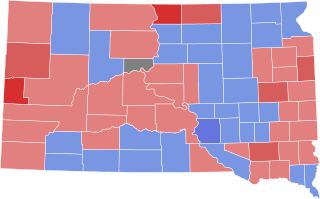
The 1938 United States Senate elections in South Dakota took place on November 8, 1938. Incumbent Republican Senator Peter Norbeck died in office on December 20, 1936. Herbert E. Hitchcock was appointed by Governor Tom Berry as Norbeck's replacement. Two elections for the same Senate seat were held on the same day; one as a special election to fill the remainder of Norbeck's six-year term, and another to select a Senator to serve the next six-year term.

The 1930 South Dakota gubernatorial election was held on November 4, 1930. Incumbent Democratic Governor William J. Bulow declined to run for re-election to a third term, instead opting to successfully run for the U.S. Senate. The Republican nomination was hard-fought and the primary was crowded; because no candidate received 35% of the vote, state law required that the nomination be decided at a state party convention. There, former State Senator Warren Green, the last-place finisher in the primary, defeated Secretary of State Gladys Pyle, the plurality winner. In the general election, Green faced D. A. McCullough, the state's Rural Credits Commissioner and the Democratic nominee. Despite Bulow's success in the preceding two elections, Green defeated McCullough by a decisive margin—even as Bulow himself was elected to the U.S. Senate.

The 1940 South Dakota gubernatorial election was held on November 5, 1940. Incumbent Republican Governor Harlan J. Bushfield sought re-election to a second term. After winning the Republican primary by a large margin, he faced Democrat Lewis W. Bicknell, former Day County State's Attorney, in the general election. Though Bushfield underperformed Republican presidential nominee Wendell Willkie, who won the state in a landslide, he nonetheless defeated Bicknell by a wide margin to easily win re-election.

The 1942 South Dakota gubernatorial election was held on November 3, 1942. Incumbent Republican Governor Harlan J. Bushfield declined to seek re-election to a third term and instead successfully ran for the U.S. Senate. A crowded Republican primary developed to succeed him, and because no candidate received 35% of the vote, the nomination was decided at the state Republican convention, where former Attorney General Merrell Q. Sharpe, the second-place finisher in the primary, won the nomination. In the general election, Sharpe faced Democratic nominee Lewis W. Bicknell, the 1940 Democratic nominee for Governor. Aided by the national Republican landslide, Sharpe defeated Bicknell in a landslide.

